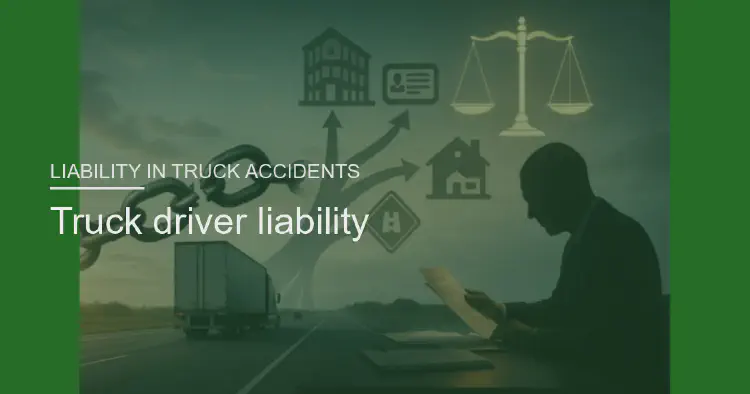Truck driver liability
Truck drivers are the individuals directly operating commercial vehicles, and their actions are often the first factor examined when determining liability after a crash.
- Truck Accident Law Team
- 2 min read
Article 1 of 6 in Liability in Truck Accidents/

Truck Driver Liability in Accidents
Basis for Driver Liability
Truck drivers can be held personally liable for accidents when their actions or inactions directly cause harm. Common forms of negligence include:
- Fatigue: Driving beyond Hours of Service (HOS) limits or ignoring rest requirements.
- Distracted Driving: Using a cell phone, eating, or adjusting GPS devices.
- Driving Under the Influence: Alcohol, drugs, or impairing medications.
- Speeding and Reckless Driving: Exceeding posted limits or driving too fast for weather/road conditions.
- Improper Maneuvers: Unsafe lane changes, failure to signal, or wide turns.
- Failure to Inspect the Vehicle: Neglecting daily inspection duties that could have prevented mechanical failures.
Legal Standards
- Drivers have a duty of care to operate their vehicles safely and follow both federal and state regulations.
- Violating FMCSA or traffic laws (e.g., HOS, CDL requirements) can amount to negligence per se, making liability easier to prove.
Evidence Used Against Drivers
- Logbooks and Electronic Logging Device (ELD) data.
- Phone records to establish distraction.
- Toxicology reports for drug/alcohol impairment.
- Police reports and eyewitness accounts.
- Dashcam or surveillance footage.
Consequences of Liability
- Civil Liability: Drivers may be personally sued for damages, although trucking company insurance often provides coverage.
- Criminal Liability: In cases of DUI, reckless driving, or fatal crashes, drivers may face criminal charges.
- Employment Consequences: CDL suspension, job loss, and disqualification from future trucking employment.
Interaction with Company Liability
- Even when a driver is at fault, trucking companies may share liability under vicarious liability (employers responsible for employees’ actions within the scope of employment).
Summary: Truck drivers carry a heavy responsibility on the road. When negligence such as fatigue, distraction, or impairment causes an accident, they can be held personally liable in both civil and criminal proceedings. Their liability is often the first layer in complex multi-party truck accident litigation.
You might also like:
- Tags:
- Trucking Companies
- Hours Service
- Trucking Company
- Accident Litigation
- Truck Drivers
- Police Reports
- Truck Driver
- Drug Alcohol
- Electronic Logging
- Federal State
- Service Hos
- Road Conditions
- Eld Data
- Distracted Driving
- Mechanical Failures
- State Regulations
- Liability Truck
- Hos Limits
- Traffic Laws
- Weather Road
- Reckless Driving
- Vicarious Liability
- Evidence Used
- Multi Party
- Device Eld
- Logging Device
- Company Liability
- Future Trucking
- Scope Employment
- Truck Accident Litigation
- Hours Service Hos
- Weather Road Conditions
- Federal State Regulations
- Electronic Logging Device
- Logging Device Eld
- Service Hos Limits
- Liability Truck Drivers
- Multi Party Truck
- Device Eld Data
- Police Reports Eyewitness